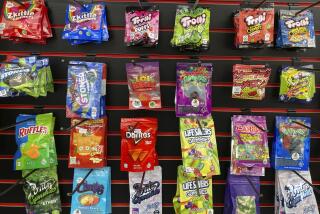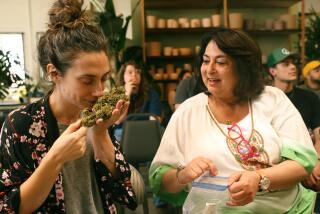Q&A: Parents, here’s what you need to know when talking to kids about pot
Reporting from Seattle — Kelly Kerby is a licensed mental health counselor and chemical dependency professional who works at Eckstein Middle School in Seattle. Inga Manskopf manages the Prevention WINS Coalition at Seattle Children’s Hospital.
For parents in states where recreational marijuana use is legal, their message is simple: Talk to your kids early and often. They talked to the Los Angeles Times about the most important information for parents to know when talking to their children about marijuana:
What do I do now that it’s legal? What do I say to my kids?
Kelly Kerby: Say something to them. Let them know that legal does not mean safe. And it definitely does not mean safe for youth. And it’s 21 and older. It is not legal for youth, for people under 21. It’s legal, but it’s not legal for your kids.
When should I first talk to my kids?
KK: Early and often.
Inga Manskopf: We tell parents to talk to their kids about all drugs, at the latest between fifth and sixth grade, especially because of the transition from elementary school to middle school and middle to high school. Those transition years are big years for kids. Those are good opportunities to talk to children: You’re going into a new school. You’re going to maybe have new friends. You’re going to be in a new environment, have new challenges. This is how our family feels about drugs and we expect you to follow our rules, and if you don’t this is what’s going to happen.
It should be interesting in the next few years, as marijuana advertisements roll out, that we have some teachable moments there for parents. ... If there’s something that’s overtly about marijuana in an ad and your kid says, ‘Mom, what’s that?’ and you’re at a stoplight looking at it, those are teachable moments.
If smoking is out, are edibles and vaporizing OK?
KK: Absolutely not. Those things can be very dangerous and it’s important to educate parents on the types of edibles that are out there right now. It’s kind of up in the air in Washington.
IM: They aren’t going to allow gummy bears, but they have things like cherry soda, chocolate chip candy bars. It doesn’t look like a gummy bear or a goldfish cracker but it is sort of sweet.
KK: It can look very appealing. Those can actually be very dangerous for young people because it takes so long for the drug to get to their brain and if your child is caught consuming those, it’s OK to take them to the emergency room. The vaporizing, again, you’ve taken away the smoke, but you’ve left the drug and it’s still impacting their brain.
I smoked it and I’m OK. Why shouldn’t my kid?
KK: Where to start with that one? Be educated on how marijuana has changed. A lot of people smoked even 10 years ago and the potency continues to go up. You’re dealing with a different type of marijuana. That’s one of the big ones.
Also, just because you did something when you were young, it doesn’t necessarily make it OK for your child. If you want them to make every mistake you did, fine. I ask parents: Are your kids exactly like you? They’re not exactly like you. The marijuana is not the same. And the times we’re living in aren’t the same. You’ve got a lot of other dangerous factors out there, a lot of other drugs that are accessible.
How do I keep my kids from using?
IM: No. 1, keep it locked away if you choose to have it in the house. You don’t have to have it in the house. You don’t have to have alcohol in your home. You don’t have to have marijuana in your home. If you do choose to have it though, monitor it. Keep it up and away from kids. Lock it up. Whatever you’re going to do so kids don’t get their hands on it.
In general, you want to have family rules. If you don’t think that marijuana or alcohol should be used by anyone under the age of 21, you say that to your kids. You say, the law is 21, in this house we respect the law and we think that you shouldn’t use before you’re 21 years old. If we find that you have used, these are the consequences: You lose your iPhone for however long you choose and then you follow up on those consequences.
How do I talk to my kids about marijuana?
KK: You talk to them in casual moments, with teachable moments, not in a scolding manner. Involve them in the conversation. See what they think about drugs and alcohol. If they’re young, how do they think drugs could get in the way of their dreams and goals? And let them know what your expectations are. Let them know what the consequences are -- good and bad. And monitor them, follow up on that.
I think it’s great to talk to kids, too, about people who do use responsibly. There are people who can drink responsibly, but they’re over 21. That there are people who don’t drink, and they’re OK, too. You can use responsibly, but part of that is using when you’re 21, when you’re old enough, when you’re in a safe place, when you’re not driving.
“A Parent’s Guide to Preventing Underage Marijuana Use” is available online through the Washington State Liquor Control Board and Seattle Children’s Hospital, among other sites.
Follow @marialaganga for national news
More to Read
Sign up for Essential California
The most important California stories and recommendations in your inbox every morning.
You may occasionally receive promotional content from the Los Angeles Times.











